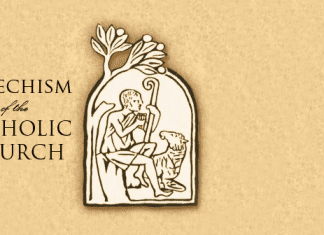Catechism of The Catholic Church #156
156 What moves us to believe is not the fact that revealed truths appear as true and intelligible in the light of our natural reason: we believe "because of the authority of God himself who reveals them, who can neither deceive nor be deceived". So "that the submission of our faith might nevertheless be in accordance with reason, God willed that external proofs of his Revelation should be joined to the internal helps of the Holy Spirit." Thus the miracles of Christ and the saints, prophecies, the Church's growth and holiness, and her fruitfulness and stability "are the most certain signs of divine Revelation, adapted to the intelligence of all"; they are "motives of credibility" (motiva credibilitatis), which show that the assent of faith is "by no means a blind impulse of the mind".
Catechism of The Catholic Church #178
178 We must believe in no one but God: the Father, the Son and the Holy Spirit.
Catechism of The Catholic Church #250
250 During the first centuries the Church sought to clarify her Trinitarian faith, both to deepen her own understanding of the faith and to defend it against the errors that were deforming it. This clarification was the work of the early councils, aided by the theological work of the Church Fathers and sustained by the Christian people's sense of the faith.
Catechism of The Catholic Church #157
157 Faith is certain. It is more certain than all human knowledge because it is founded on the very word of God who cannot lie. To be sure, revealed truths can seem obscure to human reason and experience, but "the certainty that the divine light gives is greater than that which the light of natural reason gives." "Ten thousand difficulties do not make one doubt."
Catechism of The Catholic Church #159
159 Faith and science: "Though faith is above reason, there can never be any real discrepancy between faith and reason. Since the same God who reveals mysteries and infuses faith has bestowed the light of reason on the human mind, God cannot deny himself, nor can truth ever contradict truth." "Consequently, methodical research in all branches of knowledge, provided it is carried out in a truly scientific manner and does not override moral laws, can never conflict with the faith, because the things of the world and the things of faith derive from the same God. the humble and persevering investigator of the secrets of nature is being led, as it were, by the hand of God in spite of himself, for it is God, the conserver of all things, who made them what they are."
Catechism of The Catholic Church #2792
2792 Finally, if we pray the Our Father sincerely, we leave individualism behind, because the love that we receive frees us from it. the "our" at the beginning of the Lord's Prayer, like the "us" of the last four petitions, excludes no one. If we are to say it truthfully, our divisions and oppositions have to be overcome.
Catechism of The Catholic Church #1746
1746 The imputability or responsibility for an action can be diminished or nullified by ignorance, duress, fear, and other psychological or social factors.
Catechism of The Catholic Church #1016
1016 By death the soul is separated from the body, but in the resurrection God will give incorruptible life to our body, transformed by reunion with our soul. Just as Christ is risen and lives for ever, so all of us will rise at the last day.
1016 By death the soul is separated from the body, but in the resurrection God will give incorruptible life to our body, transformed by reunion with our soul. Just as Christ is risen and lives for ever, so all of us will rise at the last day.
Catechism of The Catholic Church #2548
2548 Desire for true happiness frees man from his immoderate attachment to the goods of this world so that he can find his fulfillment in the vision and beatitude of God. "The promise [of seeing God] surpasses all beatitude.... In Scripture, to see is to possess.... Whoever sees God has obtained all the goods of which he can conceive."
Catechism of The Catholic Church #1464
1464 Priests must encourage the faithful to come to the sacrament of Penance and must make themselves available to celebrate this sacrament each time Christians reasonably ask for it.














